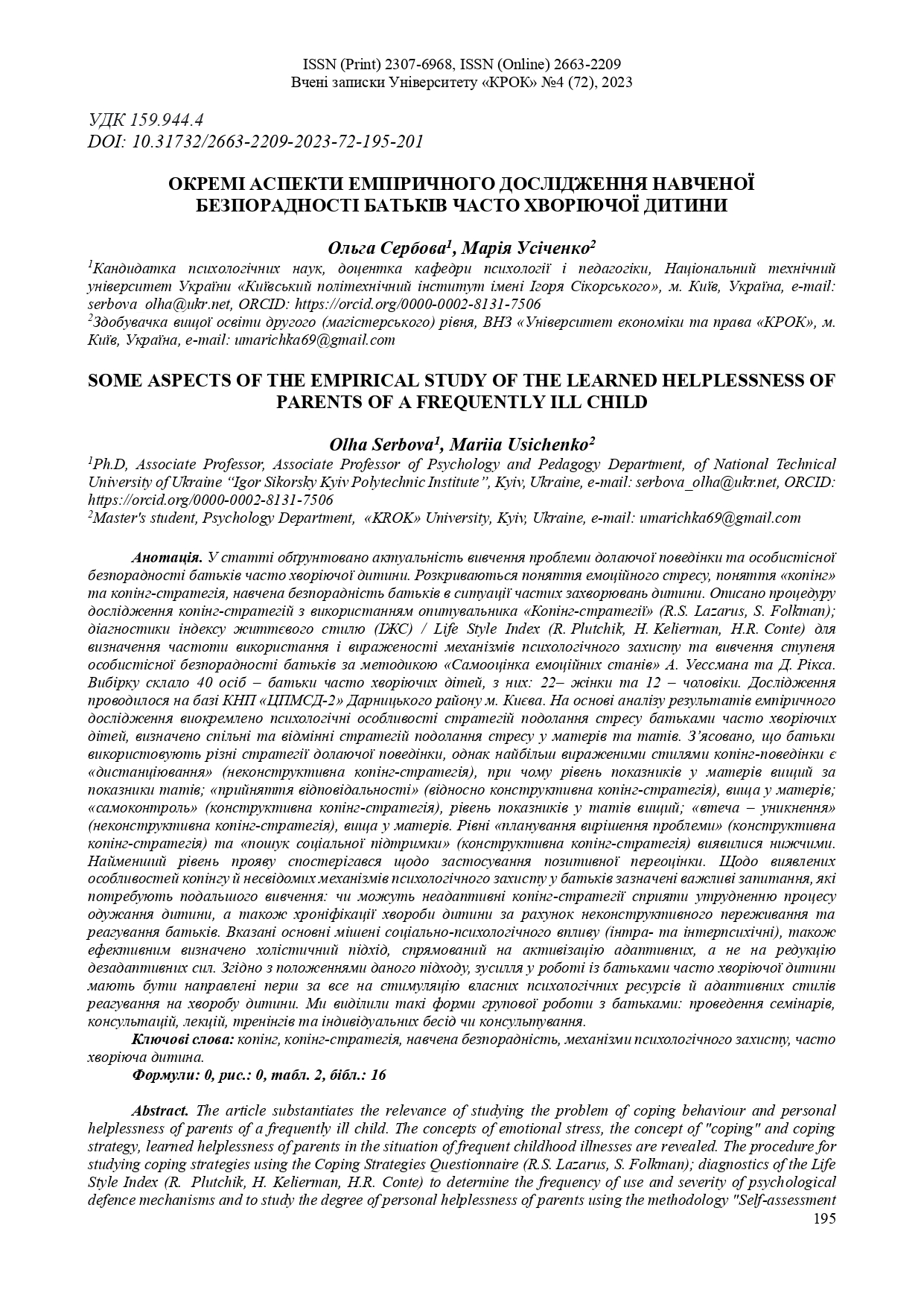SOME ASPECTS OF THE EMPIRICAL STUDY OF THE LEARNED HELPLESSNESS OF PARENTS OF A FREQUENTLY ILL CHILD
DOI:
https://doi.org/10.31732/2663-2209-2023-72-195-201Keywords:
coping, coping strategy, learned helplessness, psychological defence mechanisms, frequently ill childAbstract
The article substantiates the relevance of studying the problem of coping behaviour and personal helplessness of parents of a frequently ill child. The concepts of emotional stress, the concept of "coping" and coping strategy, learned helplessness of parents in the situation of frequent childhood illnesses are revealed. The procedure for studying coping strategies using the Coping Strategies Questionnaire (R.S. Lazarus, S. Folkman); diagnostics of the Life Style Index (R. Plutchik, H. Kelierman, H.R. Conte) to determine the frequency of use and severity of psychological defence mechanisms and to study the degree of personal helplessness of parents using the methodology "Self-assessment of emotional states" by A. Wessman and D. Ricks. The sample consisted of 40 people – parents of frequently ill children, including 22 women and 12 men. The study was conducted on the basis of the Municipal Non-Commercial Enterprise "Central Primary Health Care Centre-2" in Darnytsia district of Kyiv. Based on the analysis of the results of the empirical study, the psychological features of stress coping strategies of parents of frequently ill children were identified, common and different strategies of stress coping in mothers and fathers were determined. It has been found that parents use different coping strategies, but the most pronounced coping styles are "distancing" (non-constructive coping strategy), with mothers' scores higher than fathers'; "acceptance of responsibility" (relatively constructive coping strategy), higher for mothers; "self-control" (constructive coping strategy), higher for fathers; "escape - avoidance" (non-constructive coping strategy), higher for mothers. The levels of "planning to solve the problem" (constructive coping strategy) and "seeking social support" (constructive coping strategy) were lower. The lowest level of manifestation was observed in the use of positive reappraisal. With regard to the identified features of coping and unconscious psychological defence mechanisms in parents, important questions have been identified that require further study: whether maladaptive coping strategies can contribute to the difficulty of the child's recovery process, as well as to the chronicisation of the child's illness due to non-constructive experiences and reactions of parents. The main targets of socio-psychological influence (intra- and interpersonal) are indicated, and a holistic approach aimed at activating adaptive rather than reducing maladaptive forces is also identified as effective. According to the provisions of this approach, efforts in working with parents of frequently ill children should be aimed primarily at stimulating their own psychological resources and adaptive styles of responding to the child's illness. We have identified the following forms of group work with parents: seminars, consultations, lectures, trainings, and individual conversations or counselling.
Downloads
References
Александров, Ю. В. (2019). Проблема копінг-стратегії в ситуації неуспіху. «Особистість, суспільство, закон» : тези доп. учасників міжнар. наук.-практ. конф., присвяч. пам’яті проф. С. П. Бочарової (25 квіт. 2019 р., м.Харків, Україна), 11-15. https://t1p.de/m9t0e
Аршава, І. Ф., & Корнієнко, В. В. (2015). Роль активних стратегій подолання стресу в прогнозуванні емоційної стійкості батьків важкохворих дітей. Збірник наукових праць «Проблеми сучасної психології» № 1(7), 13-21. https://t1p.de/1szr9
Войцеховська, О., & Закалик, Г. (2016) Сучасні напрями досліджень копінг-стратегій особистості. Педагогіка і психологія професійної освіти. № 2, 95–104.
Наугольник, Л. Б. (2015). Психологія стресу: підручник. Львів : Львівський державний університет внутрішніх справ, 324 с.
Ніколаєв, Л., Руденко, О., Чижма, Д., & Озеллі, О. (2022). Психологічні особливості копінг-поведінки як форми подолання стресу у самотніх жінок в умовах невизначеності. Вісник Національного університету оборони України, 66(2), 79–88. https://doi.org/10.33099/2617-6858-2022-66-2-79-88
Олефір, В. О. (2011). Взаємозв’язок життєстійкості, копінг-стратегій та психологічного благополуччя. Вісник Харківського національного університету імені В. Н. Каразіна. Серія : Психологія. № 981. Вип. 47, 168– 172.
Родіна, Н. В. (2013). Психологія копінг-поведінки: системне моделювання: дис. … докт. психол. наук. Київський нац. ун-т імені Т. Г. Шевченка, 504 с.
Сербова, О.В. (2015). Теоретичний аналіз проблеми формування навичок копінг-стратегій батьків дитини з обмеженими можливостями здоров’я. Україно-польські психолого-педагогічні студії: актуальні проблеми педагогічної теорії та практики : зб. наук. ст. / заг. ред. І.Г. Улюкаєва. Бердянськ : БДПУ, 158-163.
Сивогракова, З. А. (2007). Вивчення копінгу як особистісної адаптаційної здібності. Педагогіка і психологія. № 22, 159–169.
Шебанова, В. І., & Діденко, Г. О. (2017). Копінг-поведінка у сучасних психологічних дослідженнях. Збірник наукових праць «Проблеми сучасної психології», (39), 368–379. https://doi.org/10.32626/2227-6246.2018-39.368-379
Ярош, Н. С. (2015). Аналіз досліджень внутрішніх предикторів стрес-долаючої поведінки». Вісник Харківського національного університету імені В. Н. Каразіна. Серія : Психологія. № 58, 60–64.
Frydenberg, E. (2002). Beyond Coping. Meeting goals, visions and challenges. Oxford University Press. 272 р.
Zuckerman, M., Gagné, M. (2003) The COPE revised: Proposing a 5-factor model of coping strategies. Journal of Research in Personality. Vol. 37. № 3, 169–204
Frydenberg, E., & Lewis, R. (2000).Teaching Coping to adolescents: when and to whom? American Educational Research Journal. No 37, 727–745.
Lazarus, R. S. (2000). Toward Better Research on Stress and Coping. American Psychologist, No 55, 665–673
Seligman, M. (1992). Helplessness: On depression, development, and death. New York: Freeman, 250.

Downloads
Published
How to Cite
Issue
Section
License

This work is licensed under a Creative Commons Attribution-NonCommercial 4.0 International License.

